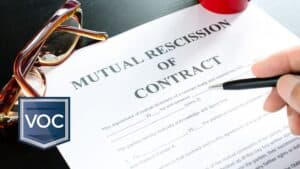What Is a Timeshare Loan?
A timeshare loan is a type of financing used to purchase vacation ownership, typically offered at high interest rates with little consumer protection. Unlike traditional mortgages or personal loans, timeshare loans often include hidden costs, limited refinancing options, and long-term obligations that trap buyers in contracts they regret.
Why Do People Take Out a Timeshare Loan?
Most people don’t plan on financing a timeshare. It usually happens after attending a high-pressure sales presentation in exchange for a free gift or vacation perk. Sales reps use emotional triggers and limited-time offers to convince attendees that buying now—on a timeshare loan—is the only way to secure unforgettable vacations with loved ones.
Unlike cars or other large purchases, which consumers research thoroughly, timeshares are often purchased on impulse. Buyers typically know very little about fractional ownership before they sign the dotted line. As a result, they often end up with a timeshare mortgage they don’t fully understand—and regret.
How Do Consumers Get Stuck in a Timeshare Loan?
Sales presentations create a false sense of urgency. They bombard attendees with “what if” scenarios, lifestyle fantasies, and misleading affordability claims. Many people don’t plan to buy—but walk away with a timeshare loan because the sales pitch made them feel like they had no other choice.
Once the vacation dream fades, reality sets in. Owners quickly realize they can’t easily book the condo, total costs far exceed expectations, and the timeshare resale market barely exists. Interest rates, annual fees, and deceptive financing terms turn what seemed like a luxury into a financial burden.
The Psychology Behind the Timeshare Sale
Timeshare companies train their sales teams to build rapport and mimic empathy. They make buyers believe that signing a timeshare mortgage is their own idea. Many families have shared stories about how these sales reps positioned ownership as a way to finally prioritize family time or live a life they previously couldn’t afford.
This emotional manipulation is no accident. Resorts target households that lack the budget for lavish travel. They present the timeshare refi option as an easy out—knowing full well that almost no financial institution will finance a timeshare loan for better financing terms.
How Misleading Is a Timeshare Loan, Really?
Very. Most people believe they’re borrowing $20,000 to own a slice of paradise. But when you factor in 17–20% interest rates, long repayment terms, and growing annual fees, that same timeshare loan ends up costing $45,000 or more.
Worse yet, many buyers were told they could refinance. But when they attempt a timeshare refi, they find out they don’t qualify. Even if you pay off your timeshare mortgage, maintenance fees remain. In 2025, these fees average $1,400 annually and often increase without warning.
Over time, many owners try to “upgrade” their experience, only to sign additional contracts. These new purchases often come with separate timeshare loans and compound the financial pain. What starts as $354/month can easily become $1,670/month, snowballing into over $100,000 in long-term debt.
Why Understanding Timeshare Financing Matters
Timeshare companies sell dreams—but finance nightmares. Buyers need to understand that a timeshare loan is not just a payment plan; it’s a long-term liability with almost no resale value.
Many of our clients thought they were making a smart investment. They believed the low monthly payments made sense—until they added up the total costs. Once they realized how difficult it is to get out of a timeshare loan, they came to us looking for answers.
Whether you’re exploring a timeshare mortgage cancellation, refinancing options, or just trying to get out of a timeshare mortgage, knowing how the system works can save you years of frustration.
How to Get Out of a Timeshare Loan
Getting out of a timeshare loan isn’t easy—but it’s possible. Some owners attempt a timeshare refi to reduce the high interest rate, only to find out the bank won’t refinance a timeshare loan. Others try to sell, only to discover there’s little demand and no legitimate resale market. That’s where professional cancellation services come in.
At Vacation Ownership Consultants (VOC), we help owners understand their options and guide them through reliable exit strategies. We offer tailored solutions based on your circumstances and ownership—not cookie-cutter promises.
Final Thoughts on Timeshare Loans
Timeshare loans may seem like a ticket to luxury vacations, but they often become a financial trap. High interest rates, rising maintenance fees, and deceptive sales tactics make these loans difficult to escape. Whether you want to cancel your timeshare mortgage when a timeshare refi doesn’t pan out, or simply understand your options, VOC is here to help.
Our consultants have guided thousands of owners through tried-and-true exits. If you’re ready to get out of a timeshare loan, reach out today for a free consultation. Let us show you what’s possible when you have the right team on your side.






